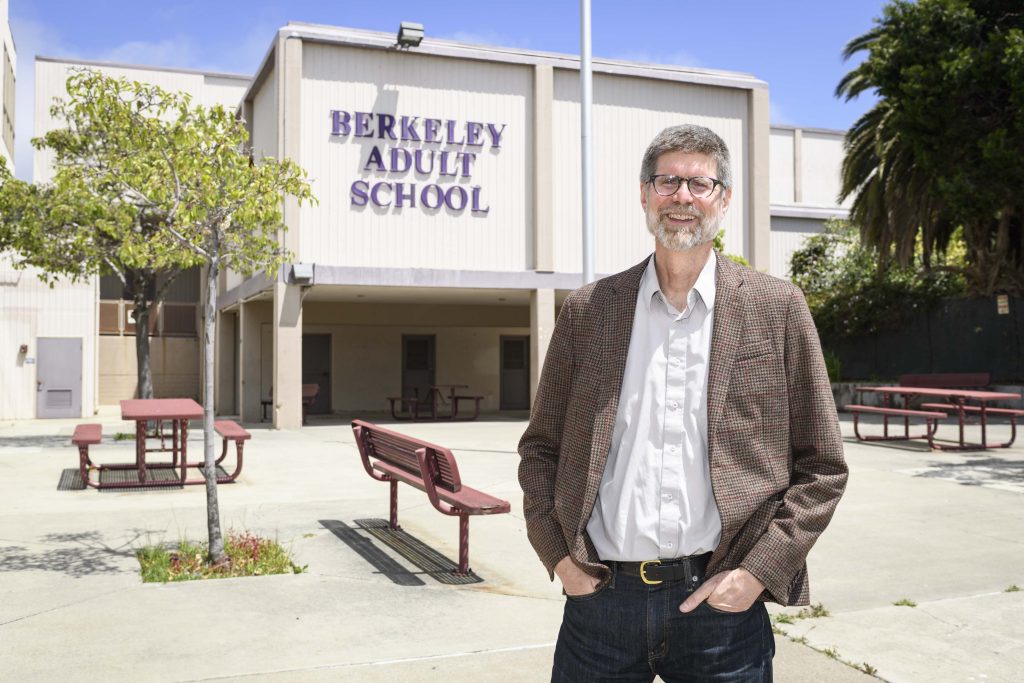Berkeley Adult School has a long history of championing learning, career readiness and life enrichment

Berkeley Adult School first opened its doors in 1881 after local citizens established what was then called Berkeley Evening School. As it celebrates its 143-year history, Berkeley Adult School continues to be a source for education, life enrichment and skilled workers in the Bay area.
“What I appreciate is that it was just the people of Berkeley who decided they needed to make education accessible to adults, to everybody, and not just to people up the hill at UC Berkeley,” says Berkeley Adult School Principal Thomas Reid.
And, over the decades since its opening, Berkeley Adult School (BAS) leaders have molded the curriculum to meet the needs of residents and employers, Reid says. After World War II, veterans armed with government tuition assistance, enrolled in Berkeley Adult School to earn their high school diplomas and learn a vocation, Reid says.
“In the 1930s. Berkeley Adult School trained people in skills like merchant marine work and maritime skills,” he says. “The G.I. Bill did a whole lot, and there was a lot of growth in adult education at that time throughout the state.”
“We’re here to foster equitable, kind and resilient communities, and we’re thinking about the impact that we want to make beyond our own walls, and we’re seeing our work as relevant to our community.”
Thomas Reid, Berkeley Adult School Principal
Adult education in California continued to experience a steep growth curve in the 1960s and much of the 1970s, he says. But in 1978, California’s Proposition 13 cut property taxes, a major source of funding for school districts. Then years later, the Great Recession hit the country from 2007 to 2009 and the Berkeley Unified School District, including BAS, faced steep budget cuts again. Because of the recession, California’s legislature gave local school boards the authority to transfer funds among their districts’ various special funded programs. In Berkeley, the District opted to keep 65 percent of its adult school funding in place, Reid says. Since then, BAS has continued to survive the ups and downs of funding, and today, the school offers career technical education (CTE), English as a second language (ESL), high school diploma and equivalency certificate programs as well as personal enrichment classes. Its CTE courses include accounting, emergency medical technician, medical office assistant, building maintenance and food services, all designed to prepare students to enter the workforce in as little as one semester.
Now, BAS is taking one of its most in-demand career tech programs, food services, and combining it with courses in math and ESL, important skills needed to successfully complete the food services program. The school rolled out the new combined program in January.
“We’re working to support those who want to get access to the culinary program, but maybe their English skills aren’t very good, or they need better math skills to scale recipes up or down,” he says.
This allows students to take food service classes without having to wait until after they complete the ESL program, Reid says. The school now plans to debut another new program that bundles its building maintenance course with ESL and math to meet the growing demand for custodial workers at local schools and institutions, he says.
“Employers need skilled people,” he says. “We’re supporting employers by providing a richer applicant pool to draw from.”
Reid says the school strives to help students succeed by offering small class sizes, tutoring services and allowing students to repeat classes when needed. And, unlike in community colleges, instructors in adult schools must possess adult education credentials, he says. Moreover, to accommodate busy, working adults, Berkeley Adult School lets students choose whether to attend classes in-person or online. Reid says the school also helps students overcome obstacles that would otherwise keep them out of school. The school even supplies Chromebook tablets to students who lack laptops at home.
“We can connect students to mental health resources, housing support, legal aid and other resources,” he says.
In addition to the academic and career technical programs, BAS offers an array of personal enrichment classes that draw many older adults seeking to keep their bodies and minds active and engaged, Reid says. The enrichment program includes creative writing, foreign language instruction, arts and crafts, music, fitness classes and more. Additionally, BAS offers adaptive sports and personal enrichment classes in partnership with local agencies like the Creative Wellness Center, the East Bay Center for the Blind and the Bay Area Outreach and Recreation Program for adults with disabilities.
“We’re here to foster equitable, kind and resilient communities, and we’re thinking about the impact that we want to make beyond our own walls, and we’re seeing our work as relevant to our community.”
For more information on how Berkeley Adult School can help you achieve your goals, visit bas.berkeleyschools.net or call 510-644-6130.
Written by Gail Short
| Regions | Classes & Topics |
|---|---|
| Bay Area California | Variety of Classes |